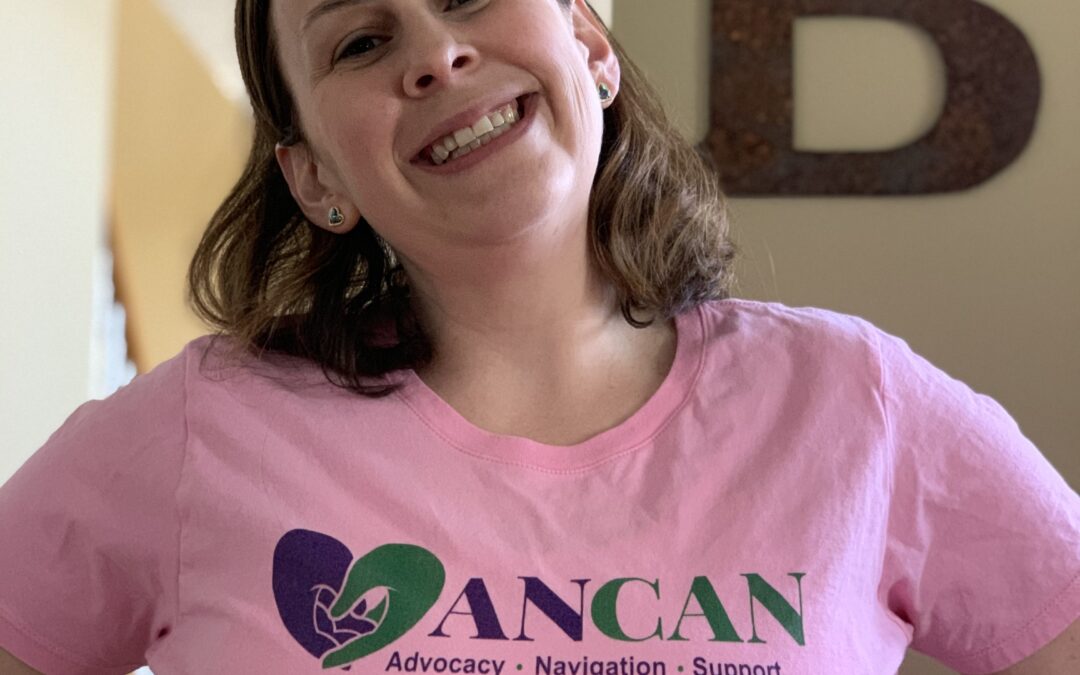
by Rick Davis | Nov 18, 2022 | Advocacy, Blood Cancers, Cancer Caregivers, Cancer Resources, mCRPC, mHSPC, nmCRPC, Ovarian Cancer, Prostate Cancer, Recent News, RMC, Volunteers, Webinars
AnCan Advisory Board Member Honored Nationally
Last night Invitae and the National Society of Genetic Counselors (NSGC) honored our amazing Advisory Board Member and Genetic Counselor, Lindsey Byrne, as one of the 14 Finalists for the Genetic Counselor of the Year Award during the National Society of Genetic Counselors Annual Conference in Nashville, TN.
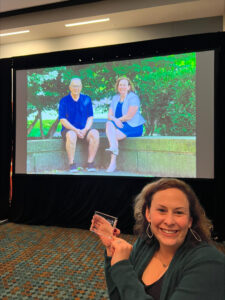 While Lindsey was not selected amongst the top 3, both we and she were honored Lindsey was invited to the Awards Ceremony. Nominated by our AnCan Advanced Prostate Cancer Group regular, Frank Fabish, who seeks his care at The Ohio State The James Comprehensive Cancer Center where Lindsey works as a Counselor and Professor, Frank and his wife Gail have benefitted and much enjoyed their consults with Lindsey. She is one of the very few genetic counselors who specializes in working with genitourinary and prostate cancer patients. Lindsey sent us a pix from the Awards Ceremony that has our Star in the foreground with nominator and nominee behind!
While Lindsey was not selected amongst the top 3, both we and she were honored Lindsey was invited to the Awards Ceremony. Nominated by our AnCan Advanced Prostate Cancer Group regular, Frank Fabish, who seeks his care at The Ohio State The James Comprehensive Cancer Center where Lindsey works as a Counselor and Professor, Frank and his wife Gail have benefitted and much enjoyed their consults with Lindsey. She is one of the very few genetic counselors who specializes in working with genitourinary and prostate cancer patients. Lindsey sent us a pix from the Awards Ceremony that has our Star in the foreground with nominator and nominee behind!
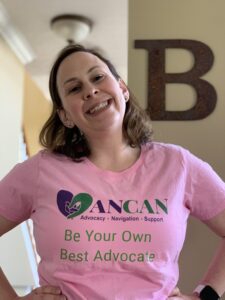 Lindsey has hosted and appeared in AnCan webinars as you see below. She also LOVES promoting our cause!
Lindsey has hosted and appeared in AnCan webinars as you see below. She also LOVES promoting our cause!
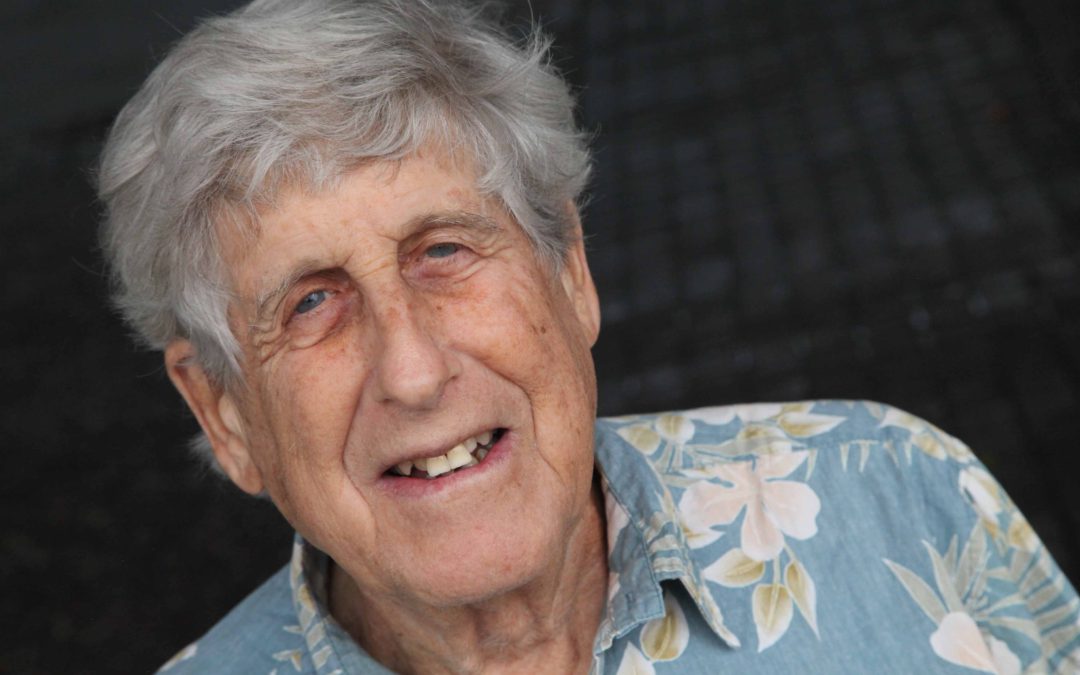
by Rick Davis | Apr 10, 2022 | Blood Cancers, Brain Tumors, Cancer Caregivers, mCRPC, nmCRPC, Ovarian Cancer, Prostate Cancer, Recent News, RMC, Thyroid Cancer, Women's Breast Cancer
Care Partners and a Woman’s Perspective
Peter Kafka’s words this week allow us to plug our wonderful Stage 3 & 4 Cancer Caregivers Group …. although Peter’s words should encourage us to consider changing its title! I have seen them in compassionate action this week reaching out to a caregiver whose daughter was recently diagnosed with a difficult T3 lung cancer, and they are magnificent.
Led by former USAF Lt. Col and Women’s Health Nurse Practitoner, Susan Lahaie, our other Moderators include Pat Washburn and Barbara Dyskant, all of whom have lost partners to cancer – Susan and Barbara to prostate cancer, and Pat to breast cancer. The Group meets 1st & 3rd Tuesdays at 8.00 pm Eastern in our Barniskis Room. While all caregivers are invited to both groups, we do not discuss grief and bereavement during our 1st Tuesday meetings. Check out the Group and sign up at https://ancan.org/cancer-caregivers/
Back to Peter Kafka’s thoughts that speak volumes adn endorse the message above:
A WOMAN’S PERSPECTIVE
I recently stumbled upon a book published back in 1897, THE WOMAN IN BATTLE, by Madame Loreta Janeta Velazquez. I have not finished it at this writing, but it has already stimulated a number of thoughts relative to our individual journeys with prostate cancer.
Madame Velazquez was a young and quite ambitious woman who disguised herself as a man and fought in the United States Civil War as an officer in the army of the Confederacy. What intrigues me about her story is that it is a candid first-hand account of battles, conflict, life in the masculine military and observations of male attitudes and behavior from a female perspective. I don’t want to go into detail about her accounts other than to say that she charged right into the fray, doing battle from the start on the front line at the Battle of Bull Run.
I bring this story up as I said because I find it relevant to my own “battle”, and perhaps yours as well, with prostate cancer. Many of us on this journey have female partners who are in their own way affected by the nature of our own infliction with prostate cancer needing some form of treatment and intervention. But we rarely, if at all in our meetings hear of this experience from the female perspective. I know that we (AnCan) and other support organizations facilitate gatherings for caregivers that give partners some outlet of expression. But for myself and many of you most of our female partners would not categorize themselves at “care givers”. They are our partners who have been thrown into the fray by no choice of their own and have tried to navigate their way through the obstacles that our disease has presented.
Recently at one of our meetings a participant asked if I knew of a woman that could speak to his wife about what to expect and experience relative to a course of ADT drugs which he was about to embark upon. This request stopped me in my tracks because I had never had such a request before. It took me a while but I was able to find a woman who was of a similar age and experience who was willing to dialogue with this man’s wife. It is never hard to find another man with experience to speak with regarding any number of prostate cancer treatment protocols. I have often relied on other “brothers” as many of you no doubt have as well. But for those of us who have female partners, they are sometimes left adrift to fend for themselves, only hearing our own complaints and miseries and sometimes the opinions of our treating physicians.
But it is important to remind ourselves that if we are blessed with a woman in our life, that they too are going through changes and challenges as a result of our prostate cancer diagnosis. Their experience and perspective are just as valid and important as our own. This is not just a MALE disease because it can affect many of the ways that we relate to female partners, physically, emotionally and mentally. It is not often that female partners join in on our calls, but they are never excluded from most of our discussions and their perspective is very much valued.
Cancer Caregivers | Virtual Support Calls For Cancer Caregivers
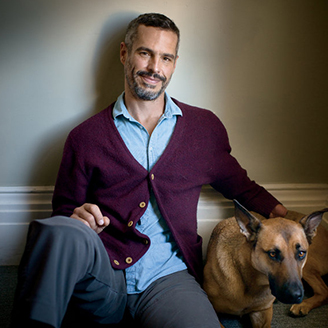
by Rick Davis | Jan 20, 2022 | Blood Cancers, Brain Tumors, Cancer Caregivers, Cancer Resources, Health Resources, hospice and palliative, Multiple Sclerosis, nmCRPC, Ovarian Cancer, Prostate Cancer, Recent News, RMC, Thyroid Cancer, Women's Breast Cancer
What do oncologists have against palliative care ….?
If you regularly attend AnCan’s virtual chat support groups, you are sure to know that whatever the condition, we frequently recommend palliative care … almost anytime and place we can.
And NO – palliative care is not about dying – it’s about preserving Quality of Life. Some of the smarter institutions have figured that changing the name to an acronym like Symptom Management Service at UCSF or Supportive Care at Memorial Sloan Kettering may account for greater acceptance and higher quality. It may also explain why these two institutions are among the best in the biz. Others like City of Hope, that still keep Palliative in their name, struggle to make palliative care easily available to their patients.
A recent article in Hospice News reports that “Cancer Patients Often Not Referred to Palliative, Mental Health Care”. Amongst 240 surveyed oncologists, only 17% referred their patients to palliative care early in the disease process. Yet many studies show that the earlier a patient is referred to palliative care, the better the outcome – especially for cancer. On more than one occasion at the same NCCN hospital, AnCan has had to navigate a participant to self refer to palliative care in order to receive treatment. In one instance, this even involved the Chief Medical Oncologist.
Given the underpinning principle in medical ethics of ‘Do No Harm’, essentially embodied in the Hippocratic Oath, how can this be?
At AnCan, we have a theory, we see this as a control issue. For some oncologists, and maybe other specialties who might collaborate with palliative care too, they are uncomfortable sharing patient management with other docs in essential areas like palliating comorbidities. While palliative care physicians are required to stay up on developments in pain treatment, antiemetic (nausea) drugs, and other forms of supportive care, oncologists have their heads buried in cancer care.
AnCan is very fortunate to have Dr. BJ Miller, one of the foremost palliative care gurus in the US, on our Advisory Board. If you doubt that, BJ’s TED Talk is now up to 14.6 million views! Dr.Miller now practices his profession from his own organization, Mettle Health; his services have comforted several AnCan participants. So we thought we would ask Dr. BJ Miller for his view on an issue he has lived with for many years …..
” I think medical training is part of the problem, as is confusing messaging around what is palliative care. and i agree that a piece of the problem is related to control, and, related, misunderstandings about how palliative care works (ie, as an additional layer of support that makes the treating physician’s life easier as well as his patients’; not a service that will steal your patient away or somehow undermine your authority).
and then there’s the culture of medicine, where death is the enemy and suffering is just part of the cost of doing business; and where medical issues are taught as separate from the psychosocial and spiritual issues a patient faces.
lastly, medicine generally does not include the caregiver/family in the equation, where much of the suffering happens.” …….. Tx BJ!
Sharing patient management may not come naturally to many physicians, especially if not part of their institutional culture. At AnCan we say, let the doctor most specialized in each aspect of care take responsibility for it on behalf of the patient. When inappropriate doctors stand in the way, the patient suffers.
Of course, AnCan is a patient driven organization ….. we welcome a response from other docs to explain what we are missing!

by Rick Davis | Oct 24, 2021 | Advocacy, Blood Cancers, Cancer Caregivers, Cancer Resources, mCRPC, Men's Breast Cancer, Multiple Sclerosis, nmCRPC, Ovarian Cancer, Prostate Cancer, Recent News, RMC, Sarcoidosis, Thyroid Cancer, Women's Breast Cancer
‘BEING’ YOUR OWN BEST ADVOCATE
A few very important words from one of senior moderators, Peter Kafka! (rd)
We often stress the importance of “being one’s own best advocate” at our online AnCan support gatherings. After several recent personal experiences and hearing about others I thought it might be appropriate to add another word to this maxim, and that would be “vigilant”.
All too often I have noticed that I can get complacent when dealing with routine medical appointments and assume that the professionals I am working with are focused and have my best interests front and center. But like me, my medical team are human and can make mistakes and assumptions that are wrong.
Earlier this week I was at a lab I had been to many times before to get my monthly blood tests. The tech was new, but I had filled out the orders online when making my appointment and had my doctor’s standing order with me. I had my sleeve rolled up and the tech was getting ready to unwrap the needle to jab me when I noticed that she only had one test tube out for sampling. I questioned this because I usually fill three or four. She said; “We’re just doing hemoglobin, right?” “No!” I replied, pulling out my previous month’s results from the notebook on my lap. “We’re doing CBC’s, Hepatic, PSA, Testosterone and more.” She retreated into the back room to consult with her supervisor and both reappeared with an apology and proceeded with the whole enchilada.
I was reminded of another occasion when I was in the hospital for a day or two after surgery from a broken femur. Looking up from my hospital bed I saw the notation on the white board that I was listed as a diabetic. No wonder my meal was so bland. Turned out that just because I was taking Metformin as a pharmaceutical for my prostate cancer their assumption was that I was diabetic. I had to straighten out their confusion.
Over the years I have learned that I need to be on “high alert” when undergoing any medical procedure, routine or otherwise. Mistakes are all too easy to make. Some might be inconsequential, but others can have serious implications. In this time when getting inoculations for covid-19, seasonal flu, shingles or other shots down the street at the local pharmacy it is doubly important to stay vigilant. Yes, these professionals are all too careful to make sure that our names and date of birth are correct on the orders and labels, but what about the injected drug or prescription? I bet that many of us have stories to tell.
So, keep your eyes open, stay vigilant, and ask questions. “Being one’s own best advocate” requires us to step up and get involved so that we understand and know the twists and curves of our medical journey even if it seems to be uncharted territory. It is our journey after all.
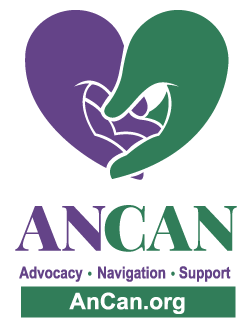
by Rick Davis | Aug 31, 2021 | Advocacy, AYA, Blood Cancers, Brain Tumors, Cancer Caregivers, Cancer Resources, Men 'Speaking Freely', Men's Breast Cancer, Ovarian Cancer, Prostate Cancer, Recent News, RMC, Sarcoidosis, Thyroid Cancer, Women's Breast Cancer
Wanna make an AnCan Rude Names Fundraiser???
Here’s our latest proposal for AnCan supporters to raise a few bucks on our behalf ……. follow Brit Paul Taylor’s lead and raise money for us with a US Version Rude Names fundraiser . And to heck with a moped … we have a few bigger bikes in this Group.
Watch Taylor’s UK Tour in this short BBC video https://www.bbc.com/news/uk-england-oxfordshire-58375401 and see a few of the places he visited below!
Maybe you just have to be a Brit to appreciate this toilet humor …. but if not, AnCan is all ears!
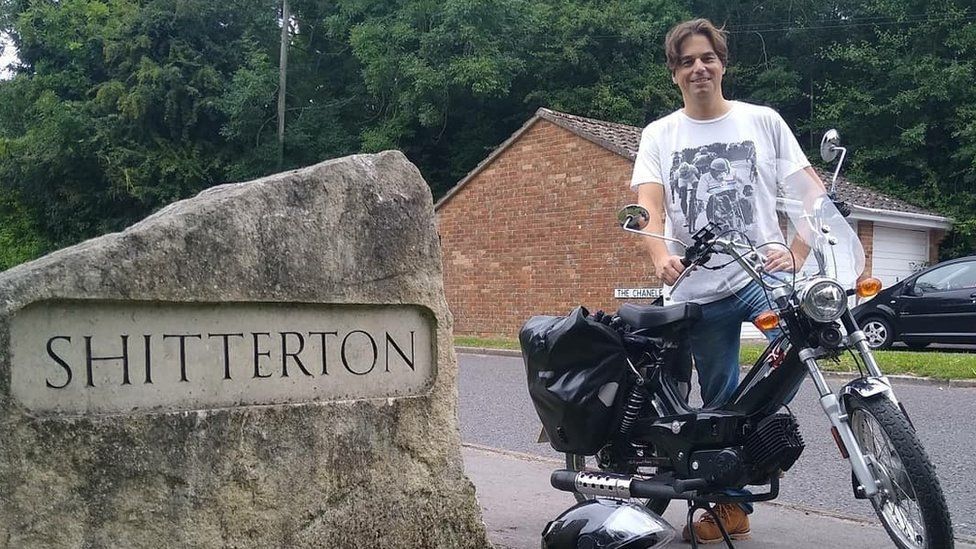

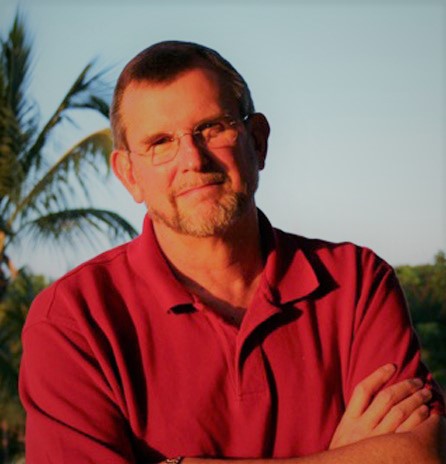
by Alexa Jett | Aug 18, 2021 | Advocacy, Blood Cancers, Cancer Caregivers, Cancer Resources, Health Resources, Multiple Sclerosis, Ovarian Cancer, Prostate Cancer, RMC, Sarcoidosis, Thyroid Cancer
We are so grateful to have Jerry Deans on our Advisory board here at AnCan. His book Lost But Not Forgotten: How Wilderness Experiences Can Transform Your Life, is just of the few days he and his wife Patsi turn pain into purpose.
Jerry was recently on the REimagine podcast, which you can listen to by clicking here.
Then, Patsi joined Jerry on another of REimagine episodes, which you can listen to by clicking here.
You’ll hear about faith, grief, and how families go through trials and tribulations.
We highly recommend listening to both, and know you will find them inspiring and uplifting!

 While Lindsey was not selected amongst the top 3, both we and she were honored Lindsey was invited to the Awards Ceremony. Nominated by our AnCan Advanced Prostate Cancer Group regular, Frank Fabish, who seeks his care at The Ohio State The James Comprehensive Cancer Center where Lindsey works as a Counselor and Professor, Frank and his wife Gail have benefitted and much enjoyed their consults with Lindsey. She is one of the very few genetic counselors who specializes in working with genitourinary and prostate cancer patients. Lindsey sent us a pix from the Awards Ceremony that has our Star in the foreground with nominator and nominee behind!
While Lindsey was not selected amongst the top 3, both we and she were honored Lindsey was invited to the Awards Ceremony. Nominated by our AnCan Advanced Prostate Cancer Group regular, Frank Fabish, who seeks his care at The Ohio State The James Comprehensive Cancer Center where Lindsey works as a Counselor and Professor, Frank and his wife Gail have benefitted and much enjoyed their consults with Lindsey. She is one of the very few genetic counselors who specializes in working with genitourinary and prostate cancer patients. Lindsey sent us a pix from the Awards Ceremony that has our Star in the foreground with nominator and nominee behind! Lindsey has hosted and appeared in AnCan webinars as you see below. She also LOVES promoting our cause!
Lindsey has hosted and appeared in AnCan webinars as you see below. She also LOVES promoting our cause!





